The kitchen apron is a silent yet significant symbol in a world where culinary arts mesh with personal expression. Often overlooked, this utilitarian garment transcends its primary function of protecting clothes. Aprons, from the essential waist apron used by servers to the heavy-duty dishwasher aprons, come in various styles and are made from different materials, each reflecting a unique aspect of the wearer’s culinary journey. Not just any apron, but the perfect apron becomes an extension of the chef’s personality, a canvas for creativity, and a testament to professionalism. As we embark on this journey of selecting the perfect cooking apron, we’re not just choosing fabric but embracing a part of our culinary identity.
Type of Aprons Used
There are many types of cooking aprons, each with unique features and benefits, available in the market, making choosing the suitable apron for your needs a vital decision.
Bib Apron: The standard choice
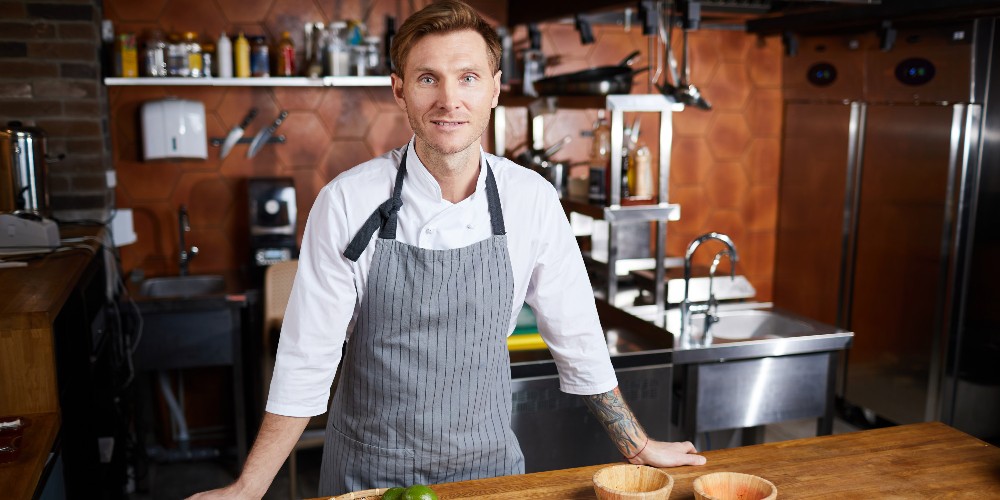
In the professional realm, bib aprons are more than just protective gear; they are badges of honour. The bib apron, a traditional style covering chest to knee, is a quintessential choice, often equipped with pockets and adjustable straps for practicality. Full aprons provide complete front coverage, a preferred option for chefs who engage in messier tasks and are essential for maintaining cleanliness. These aprons protect and signify the chef’s commitment to their craft, blending practicality with a sense of culinary tradition, marking them as the ideal apron for professional chefs.
Cobbler Aprons: Full Coverage for Messy Tasks
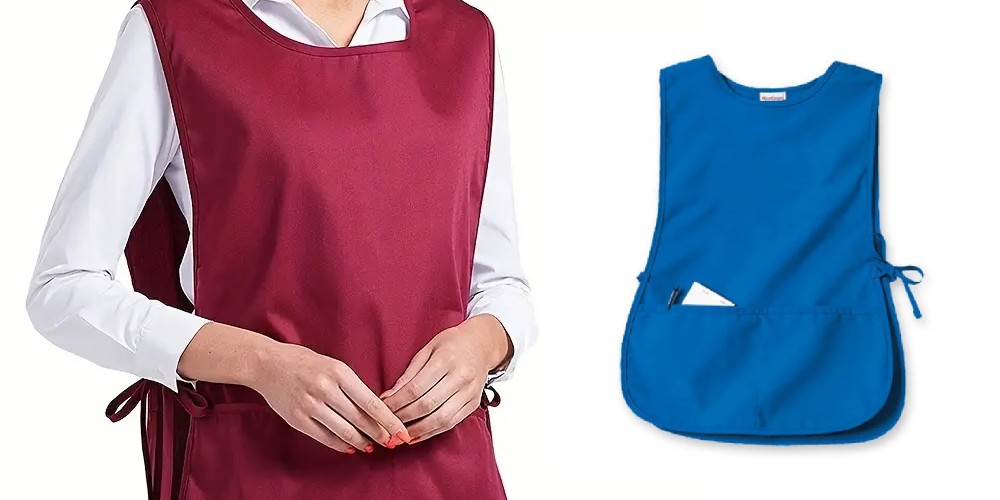
Cobbler aprons, similar to a bib apron, offer unique full front-and-back coverage, typically reaching mid-thigh. They’re especially favoured in environments where spills and splatters are frequent. Characterized by their side ties and square or slightly rounded shape, these aprons are a popular choice for their protection and ease of movement, making them ideal for both professional and home kitchens. Additionally, their design ensures they’re a great fit for various body types.
Dishwasher and Waterproof Aprons
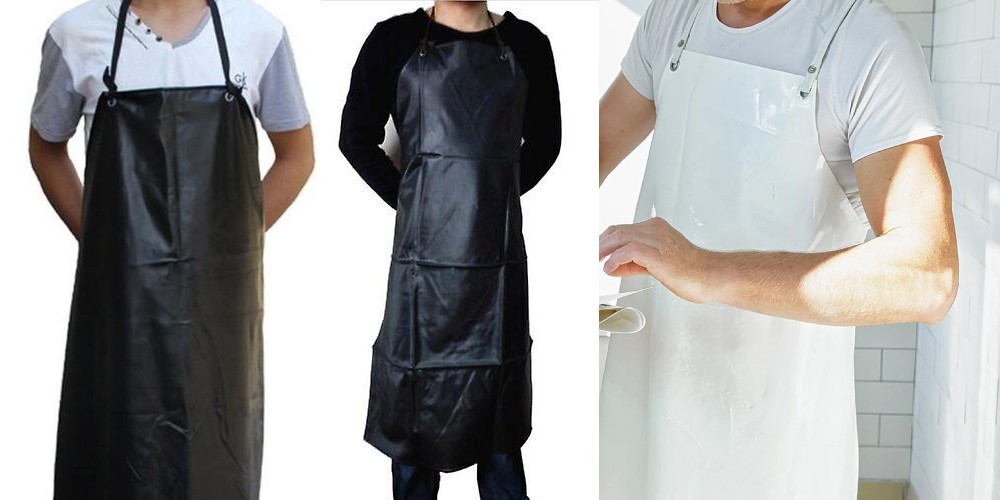
Waterproof aprons, essential for tasks involving water, like dishwashing, are designed to repel water and other liquids, usually extending to knee length or longer. Made from heavy-duty materials like vinyl or rubber, they ensure the wearer stays dry and protected even in the most water-intensive tasks, making them a perfect choice for dishwashers or chefs working with large amounts of liquid.
Bistro Aprons: The Choice for Servers
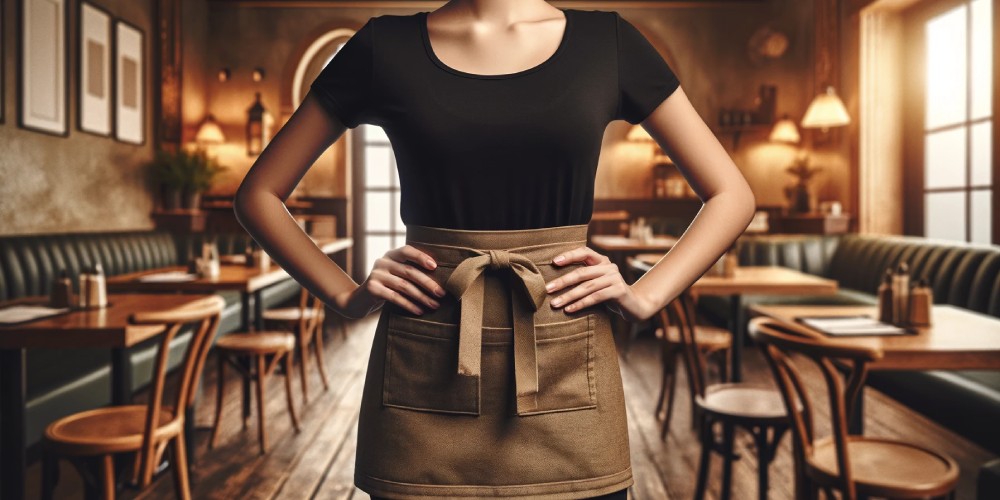
In the world of hospitality, bistro aprons are a staple. These long, narrow aprons offer protection while allowing ease of movement, making them ideal for servers in both upscale and casual dining settings. Half-bistro aprons, covering only the lower half, are a common sight in more casual dining settings, offering a blend of practicality and casual style.
Crossback Aprons: Apron Styles & Comfort
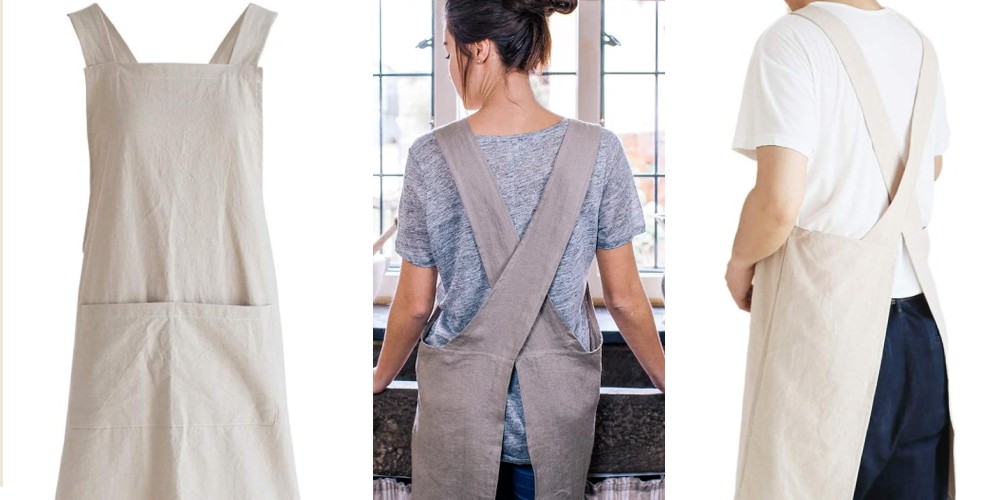
Crossback aprons, favoured for their ergonomic design, feature straps that cross over the back, distributing weight evenly and reducing neck strain. They are ideal for prolonged wear and offer ergonomic comfort and aesthetic appeal. Popular in professional and home kitchens, these aprons merge functionality with a modern, stylish flair, appealing to chefs who value comfort as much as functionality.
Tuxedo Aprons
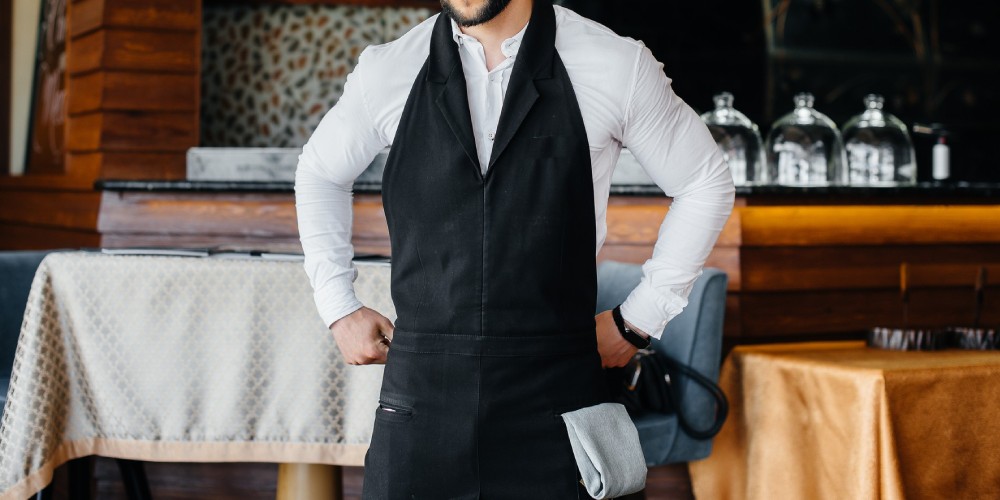
A tuxedo apron is stylish and sophisticated, often used in high-end restaurants and hospitality settings. It combines the practicality of a traditional apron with the formal aesthetic of a tuxedo, featuring a distinctive V-shaped neckline that mimics the lapels of a tuxedo jacket. This design adds an elegant touch, making it a popular choice among waitstaff and front-of-house employees who wish to present a professional and chic appearance. Tuxedo aprons typically cover the body from chest to knee and are equipped with ties around the waist for a secure fit. They may include pockets for practicality. The materials used range from durable fabrics like polyester blends to finer cloths, allowing functionality and comfort. The tuxedo apron protects the wearer’s clothing from spills and stains and enhances the overall presentation of service personnel, contributing to the upscale ambience of a dining establishment.
4-Way Aprons: Versatility in Use
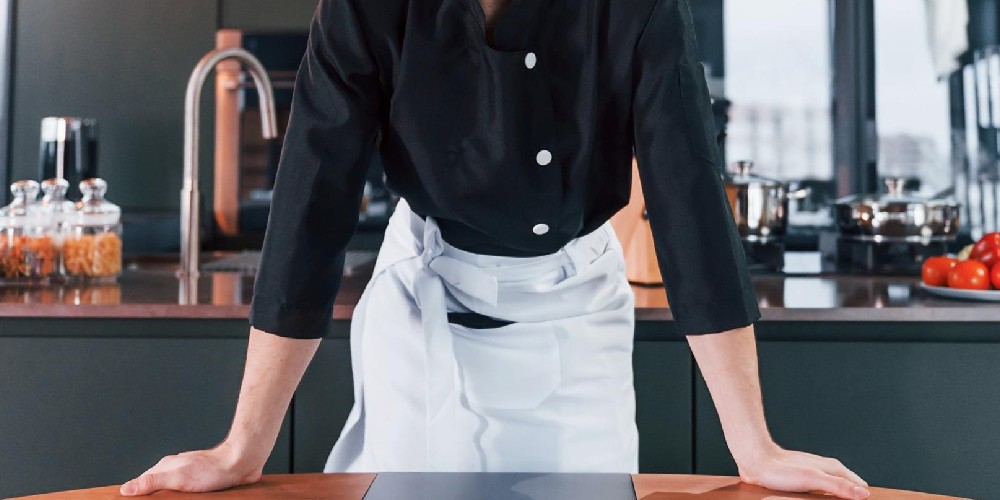
4-Way aprons, a popular type of apron, are designed for efficiency and are ideal for fast-paced kitchen environments. With four clean sides, a chef can quickly switch to a fresh front, making them especially useful in fast-paced environments. This design saves time and ensures a presentable appearance throughout service. It’s a practical solution for chefs and kitchen staff who face constant spills and splatters. Aprons made in this style of apron offer functionality and a professional look, making them a preferred choice in many commercial kitchens.
Disposable Aprons
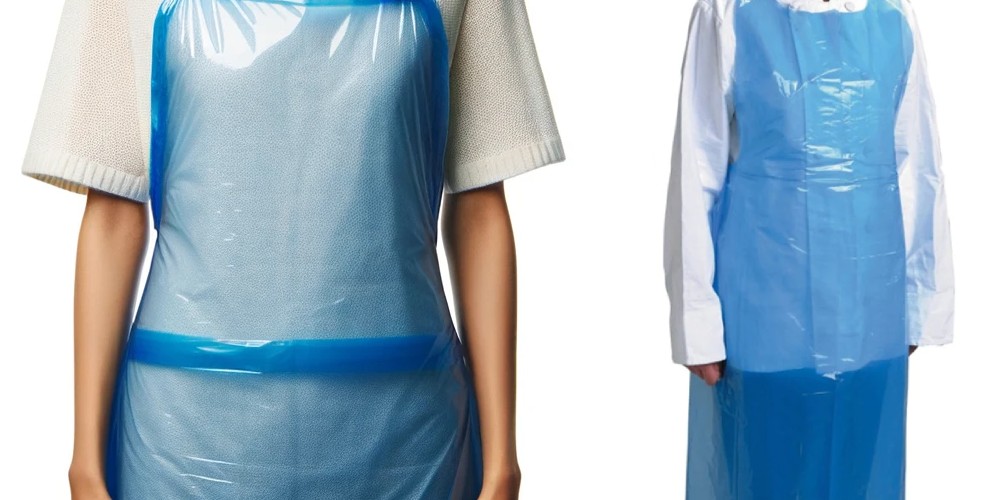
Disposable aprons, another different type of apron, are a practical choice for situations requiring quick, one-time use. Made from lightweight plastics, they are essential for maintaining hygiene and cleanliness in high-turnover environments. Ideal for medical settings, food processing, or one-off events, they provide an economical and sanitary solution. These aprons may be the right aprons for the job in settings where frequent changes are necessary to maintain cleanliness.
Woodworking Apron
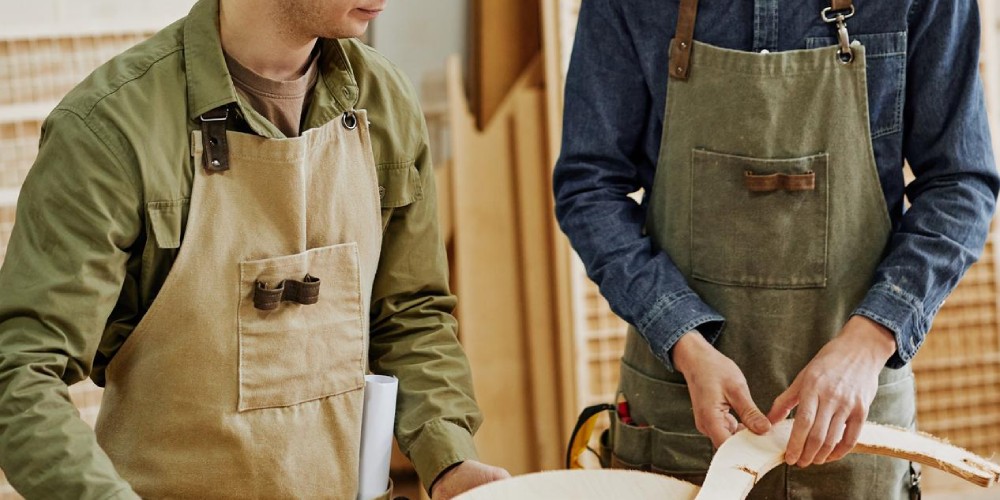
Designed for durability and protection, woodworking aprons, a traditional style of aprons, cater to the specific needs of carpenters and woodworkers. Made from sturdy materials like heavy canvas or leather, they often feature multiple pockets and loops for tools, ensuring functionality and convenience. These aprons protect against wood shavings and dust and help organize essential tools, providing full upper body coverage and durability for this type of work.
Pinafore Apron
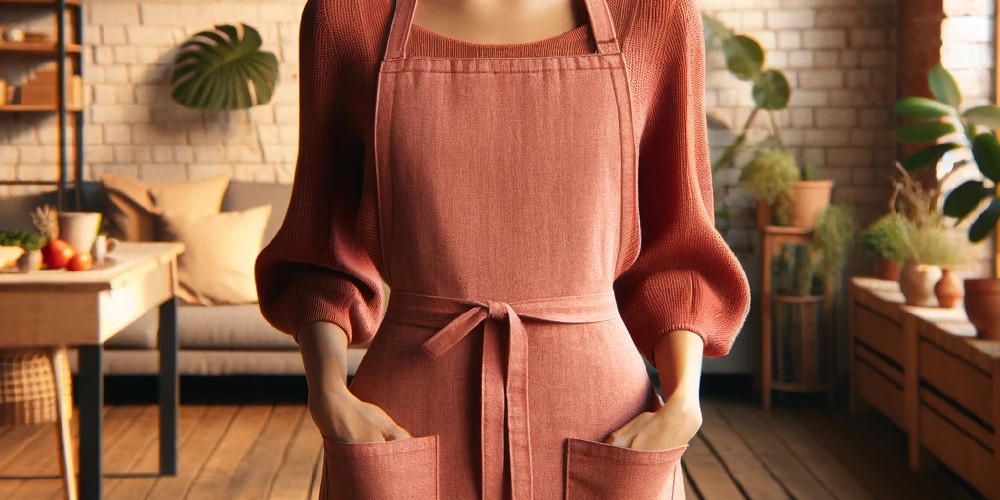
Pinafore aprons, known for their sleeveless and backless design, are tied at the back, offering charm and functionality. Originally designed as a protective garment, they have evolved into a fashion statement in modern times. Pinafore aprons are versatile, often feature decorative elements, and are suitable for light kitchen duties, crafting, or gardening. The pinafore apron is a type that combines practicality with style, making it a popular choice among different styles of aprons for various casual activities.
Understanding Apron Material – Durability and Comfort
Selecting the suitable material for your apron is as essential as choosing the right apron. Each fabric brings unique properties to the table, from cotton’s comfort to leather’s rugged durability. Whether you’re a home cook, a professional chef, or an artisan, understanding these material characteristics can help you make an informed decision that best suits your needs and environment. Let’s delve into the world of apron materials to discover what makes each unique and ideal for different tasks, especially when considering the different types and their specific applications. Aprons are essential, enhancing performance and contributing to the wearer’s comfort and efficiency.
Cotton Aprons
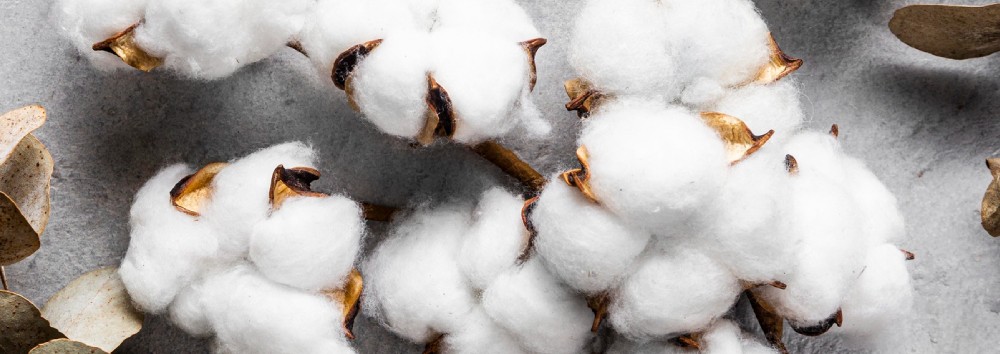
A traditional bib apron style, are known for their breathability and comfort. Ideal for everyday cooking, they are suitable for manageable and high-heat environments. They’re easy to wash and come in various colours and patterns, making them a versatile choice for professional chefs and home cooks. Moreover, these aprons usually tie an apron around your waist, ensuring a snug fit and ease of movement, offering a perfect blend of practicality and style.
Polyester Aprons
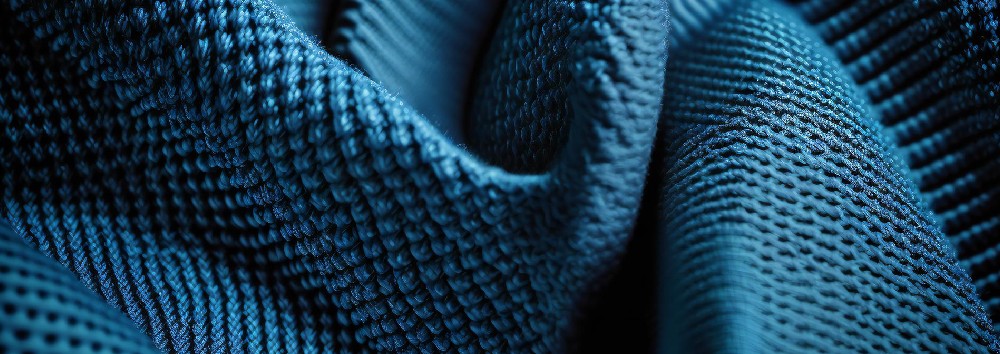
Often considered a more traditional style, offer durability and resistance to wrinkles and shrinking. They are less absorbent than cotton, making them suitable for tasks involving liquids or stains. Often used in commercial aprons and industrial settings, they blend functionality and ease of maintenance. These aprons are also ideal for food service environments where quick and easy clean-up is essential, making them a practical choice for busy professionals.
Denim aprons

A kind of apron favoured for its rugged aesthetics, are particularly suitable for heavy-duty tasks and can withstand rigorous use. The thick fabric provides better protection against heat and spills, making them a good choice for grillers or chefs in busy kitchens. Moreover, these aprons often come with waist ties and multiple pockets, making them convenient for carrying handy kitchen utensils, and their robust design caters to demanding work environments.
Leather Aprons
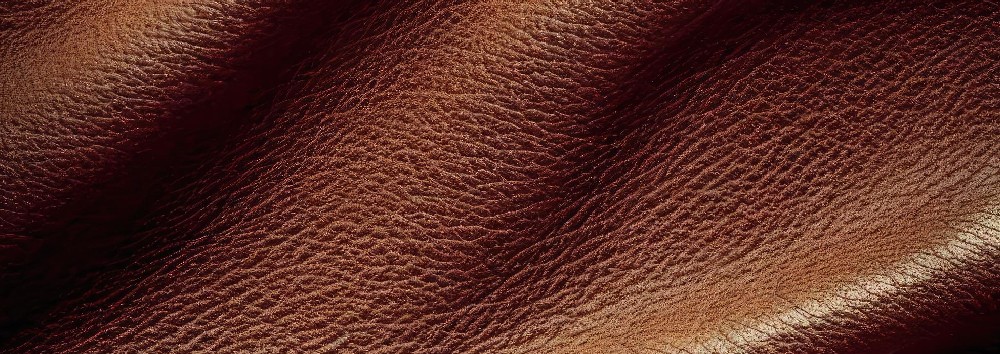
Leather aprons provide excellent protection in high-heat environments, such as grilling or blacksmithing. They are highly durable and resistant to heat and sparks. While they require more care in maintenance, their ruggedness and unique style make them popular in specific professional settings. Professional aprons like these are often considered suitable for the job in environments where extreme heat protection is necessary, making them an invaluable asset for professionals in such fields.
Design and Functionality – The Marriage of Form and Function

Here, the focus shifts to the design elements of aprons. It’s a fusion of aesthetics and practicality. Pocket placements, adjustable straps, and coverage areas are not mere design choices; they are thoughtful considerations tailored to the modern chef’s needs. Whether it’s a bustling professional kitchen or a cozy home setting, the right design can make all the difference.
- Ergonomic Design: Select aprons with designs that minimize physical strain, especially during extended cooking sessions.
- Pocket Variations: Opt for aprons with large and small pockets strategically placed for easy access to tools and ingredients.
- Adjustable Features: Choose aprons with adjustable neck and waist features to ensure a comfortable, custom fit for any body type.
Maintenance and Care – Preserving Your Apron’s Lifespan

Just as design and functionality are vital, so too is the care taken to preserve an apron’s condition. Proper maintenance not only keeps the apron looking great but also ensures it continues to perform its function effectively over time, be it in a professional kitchen or a home cooking environment.
- Material Care: Understand your apron’s fabric and follow specific washing and drying instructions to prevent damage and wear.
- Regular Cleaning: Regularly clean your apron to remove stains and build-up, maintaining both its appearance and hygiene.
- Storage Solutions: Store your apron in a way that prevents creasing and fabric stress, ensuring it’s always ready for use.
- Repair and Upkeep: Attend to minor damages like loose threads or worn straps promptly to avoid further deterioration.
The Environmental Aspect: Sustainable Choices
Choosing apron material has taken on new significance in today’s eco-conscious world. Sustainable options like organic cotton, recycled polyester, and ethically sourced fabrics are gaining popularity. This shift reflects a growing awareness of environmental impact and caters to consumers’ desire for sustainable yet functional kitchenware. Choosing a sustainable apron is a small but significant step towards a more eco-friendly culinary practice. Look for eco-certifications or labels that indicate sustainable and ethical manufacturing processes.
Quick Tips For Choosing The Right Apron
Choosing the right apron involves considering several key factors based on the specific needs and environment in which it will be used. Here are some guidelines to help you make the best choice:
- Purpose and Functionality: Identify the primary use of the apron. For instance, look for heat-resistant and stain-repellent materials for cooking or baking. If it’s for art or craftwork, choose a durable fabric that can withstand paint and glue. For waitstaff, a sleek design like a tuxedo apron might be more appropriate.
- Material: Aprons come in various materials like cotton, polyester, denim, and even rubber or PVC for more industrial purposes. Cotton aprons are comfortable but not the most durable, while polyester or synthetic blends offer better stain and wrinkle resistance. Denim and canvas are great for heavy-duty use.
- Design and Comfort: Consider the apron’s design, including how it ties (around the neck, waist, or a cross-back design), the length, and whether it has adjustable straps. Comfort is key, especially if it needs to be worn for long periods.
- Pockets and Additional Features: Depending on the use, pockets can be useful. Large, deep pockets are helpful for chefs or artists to hold tools and supplies, while smaller or discreet pockets might be preferred in hospitality settings.
- Ease of Cleaning: Look for aprons that are easy to clean, especially if they are regularly exposed to stains. Some aprons are machine washable, while others might require special care.
- Aesthetic and Style: Choose a style and colour that aligns with your personal preference or the branding of your business. Aprons can be a part of your personal style or a uniform.
- Durability: Consider the quality of the apron. It should withstand regular use and washing without quickly wearing out.
- Safety Features: For industrial or laboratory use, consider aprons with safety features like fire-resistant materials, chemical resistance, or reinforced stitching.
- Budget: Finally, consider how much you are willing to spend. Aprons range in price from inexpensive, disposable options to high-end, durable ones.

